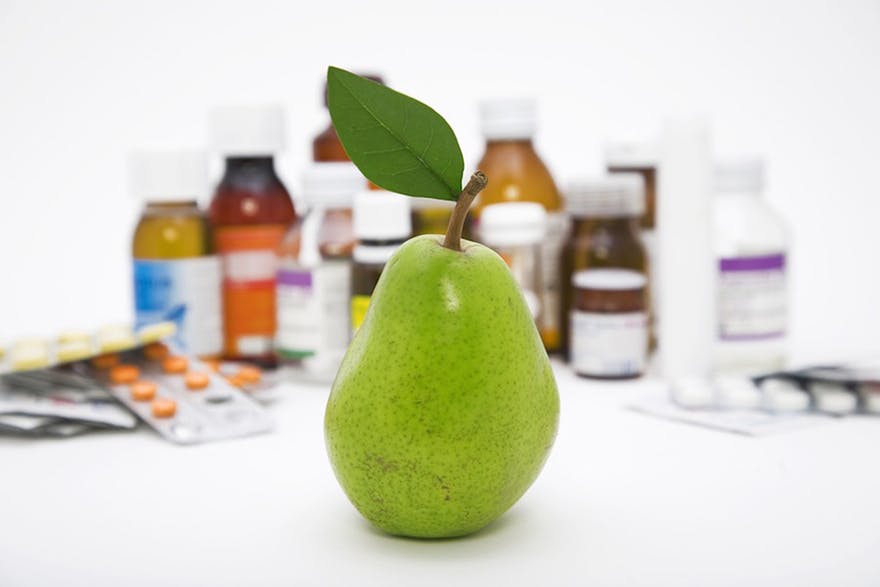Are You Getting Enough Vitamins?
VITAMINS & MINERALS
05.30.2014

While love may top some people’s list as a necessity they can’t live without, there are 13 "other essentials" humans absolutely can’t live without—and those are vitamins!1
The term 'vitamin' is a combination of the words 'vital' and 'amine.'2 In a nutshell, vitamins are organic substances your body needs to grow and function on a daily basis. Because most of these substances are not produced by the body naturally, they must come from foods and supplements that are eaten.3
Vitamin ABCs
There are 13 essential vitamins that are "must haves." They are vitamins A, C, D, E, K and eight types of B vitamins. Each has a specific duty within our body. All are essential to the daily maintenance and repairs our body needs every day.3 Converting food into energy,4 keeping cells healthy, and supporting the immune system are just a few of the jobs they assist us with.5
Think of vitamins as the oil that makes a squeaky wheel turn. Vitamins assist us with all the essential chemical processes that take place inside our bodies. The loss of any particular vitamin can hamper or block the important metabolic reactions that should be happening inside the cells our bodies need to function properly. Although rare in the United States, inadequate intake of essential vitamins overtime can lead to classical nutrient deficiencies6. For example, Vitamin D deficiency, can cause rickets - a softening and weakening of the bones.7 Vitamin B12 deficiency can cause anemia and neurological problems, such as confusion, dementia, depression, and memory loss.8 Vitamin A deficiency can cause night blindness.
A Balancing Act
You get most of the vitamins you need through the foods you eat. Well…at least that’s the way it’s supposed to happen! Unfortunately, this is not always easy in a modern and fast moving world that forever tempts us with quick and tasty foods that might not be very nutritious. And in many cases, even when we think we are "eating healthy," we may not be getting the recommended amount of essential vitamins daily. By the time fresh food gets from a farm to the supermarket, only a small fraction of the nutritional value may still be present in the food. Processing, cooking and storage for extended period of time can have impact on the nutritional value of the food.9, 10, 11 According to the U.S. Department of Agriculture (USDA), adult Americans do not typically get enough of Vitamins A, C and E, as well as Calcium, Potassium, Fiber, and Magnesium.12
While the best way to get enough vitamins is to eat a balanced diet with a variety of foods, in some cases, you may need to take a daily multivitamin help insure your are getting the recommended amount of vitamins daily. As suggested by the Harvard School of Public Health, "a daily multivitamin is a great nutrition insurance policy."13
Getting Enough of a Good Thing
So exactly how much and how many vitamins do you need every day? If you’re thinking that "if some is good, a lot is better," think again! High doses of some vitamins can have a negative effect on your health. The Food and Nutrition Board of the Institute of Medicine publish recommended dietary allowances highlighting how much of each nutrient most people should be getting on a daily basis. (Remember those fun "Food Pyramids" from high school?) Specific recommendations for each vitamin depend on age, gender, and pregnancy (if applicable).14 If you’re not sure whether you’re getting all the essential vitamins you need every day, consult with your doctor for what is best for you.
Regardless of how high love may rank on your personal necessities list, never underestimate how important vitamins are to maintaining life. Make sure your body gets what it needs to be healthy, and you’ll be loving life for many years to come.
References
- http://www.nlm.nih.gov/medlineplus/ency/article/002399.htm
- http://www.elmhurst.edu/~chm/vchembook/5900verviewmet.html
- http://www.nlm.nih.gov/medlineplus/vitamins.html
- http://www.fda.gov/ForConsumers/ConsumerUpdates/ucm118079.htm
- http://www.hopkinsmedicine.org/Press_releases/2008/08_11_08.html
- http://www.mayoclinic.com/health/vitamin-deficiency-anemia/DS00325
- http://www.nlm.nih.gov/medlineplus/ency/article/000344.htm
- http://www.nhlbi.nih.gov/health/dci/Diseases/prnanmia/prnanmia_signs.html
- http://ce.byu.edu/cw/womensconference/archive/2005/sharing_stations/pdf/52a.pdf
- http://www.fns.usda.gov/tn/Resources/menuplanner_chapter6.pdf
- http://www.rurdev.usda.gov/rbs/pub/may05/may05.pdf
- http://www.health.gov/dietaryguidelines/dga2005/document/html/chapter2.htm
- http://www.hsph.harvard.edu/nutritionsource/what-should-you-eat/vitamins/
- http://www.nlm.nih.gov/medlineplus/ency/article/002399.htm
Image Credits: caimacanul/Shutterstock.com
Recommended Articles
The 5 Best Foods That Will Help Supercharge Your Brain
Amidst our busy schedule, it's important to retain our focus and memory. Resting alone is not...
Iron deficiency is a lot more common than you would think. A recent survey by SATA CommHealth(i...
Mars vs Venus: Understanding the His and Hers of Nutritional Needs
Mars vs Venus: Understanding the His and Hers of Nutritional Gaps Although their DNAs are...






